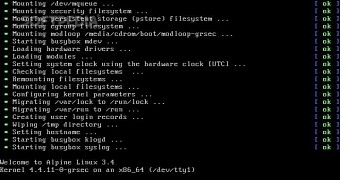Alpine Linux creator Natanael Copa has had the great pleasure of announcing the release of the Alpine Linux 3.4 operating system, ending the development of the 3.3 series.
Alpine Linux 3.4 is the first in the 3.4 stable series, offering users the most advanced GNU/Linux technologies. Among them, we can mention the long-term supported Linux 4.4 kernel (version 4.4.11 is included in the base ISO images), the OpenRC init system, DNS search domain support in the /etc/resolv.conf file.
The new Alpine Linux 3.4 series brings good news for those who want to run the server-oriented operating system in virtual machines, such as VirtualBox, QEMU, or VMWare, as they can now download a specially crafted ISO image called alpine-virt, which you can download from the official website of the distribution.
New software technologies included in Alpine Linux 3.4 are the Ruby 2.3 programming language, PostgreSQL 9.5 open-source database, Qt 5.6 GUI toolkit, as well as desktop applications like the LibreOffice 5.1 office suite and Evince 3.20 document viewer. The MATE 1.14 desktop environment is available as well.
Raspberry Pi support improved
Another major change of the Alpine Linux 3.4 release is improved support for the Raspberry Pi ecosystem, allowing users to transform their single-board computer, whether it's a Raspberry Pi, Raspberry Pi 2 Model B or Raspberry Pi 3 Model B board, into a powerful, reliable, and stable Linux server.
Support for unprivileged Internet Control Message Protocol (ICMP) sockets has been injected into BusyBox's ping utility so you can use it without root access, but only if you are in a group with GID between 999 and 59999. Also, it looks like most of the ruby-* packages have been removed from the base system.
Users are urged to use the gem command to interact with RubyGems, as well as for all of their Ruby needs. Among other noteworthy changes included in Alpine Linux 3.4, which you can download right now via our website, we can mention that the cron service has been renamed to crond and the PHP packages to php5.

 14 DAY TRIAL //
14 DAY TRIAL //